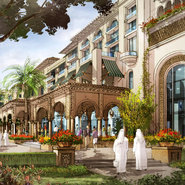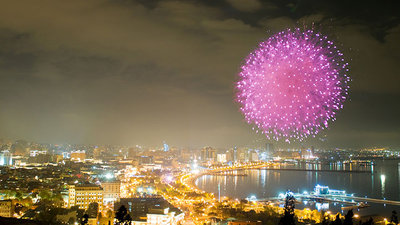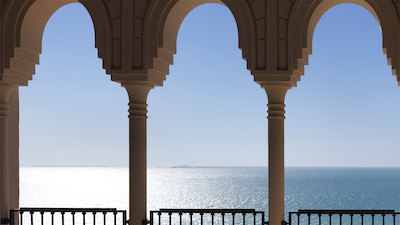 Four Seasons' Dubai property
Four Seasons' Dubai property
In recent months, despite political unrest, there has been a surge in hotel openings and property proposals across Middle Eastern countries from luxury hospitality brands.
Fairmont Hotels & Resorts announced its expansion plans into Bahrain, Trump Hotel Collection will unveil a new hotel in Azerbaijan this spring and Four Seasons Hotels & Resorts recently opened properties in Dubai, United Arab Emirates and Bahrain. With the recent reports in regards to actions from terrorist group Islamic State of Iraq and the Levant, the idea of traveling to the region for a relaxing vacation is not enticing to most, so why are luxury brands investing millions into such properties?
“In other parts of the world there have been risks before and over time they have managed the risks and become attractive destinations and it is wise to invest for the future,” said Milton Pedraza, CEO of Luxury Institute, New York.
“Today the millennials want to go anywhere, they are curious about the world; it is staking ground for the future,” he said.
Warning signs
Last week, ISIS released a video showing the execution of a Jordanian pilot as he is burned alive, an action that sparked political and religious leaders in Jordan to fight against the group with quick actions taken by executing two al-Qaeda prisoners within the next 24-hours.
Airstrikes were ordered against ISIS by Jordan, and other political and religious figures from areas across the Middle East have spoken out against ISIS’s actions. The brutal slaying of the Jordanian airman is a violation of Islam’s teachings and has raised attention.
For instance, United Arab Emirates fighter planes have joined Jordan in its airstrikes, sending out planes to locate militant locations. United Arab Emirates had taken a temporary hiatus from launching a defense against ISIS, but Jordanian pilot incidentally kick-started the country’s military actions.
Baku, Azerbaijan
The inclusion of the United Arab Emirates with the military fight against ISIS raises concerns for many industries, such as oil, but also directs attention to hotel brands which have invested millions of dollars into expansion projects in the country.
"In recent years, the Middle East has maintained a consistent luxury segment that has made the region a viable market for luxury expansion," said Taylor Rains, managing partner of Flugel Consulting, Charleston, SC. "With the rapid growth of infrastructure throughout the region, the Middle East has also generated a significant amount of interest among out-of-market, international travelers. Despite the political tensions in the region, the luxury segment continues to be interested. The area has effectively become the great new frontier for travel, with excellent food and historically significant sites. With the demand in place it's a well-founded move for luxury brands to expand more aggressively in the Middle East."
For instance, in November 2014, Four Seasons Hotels and Resorts met the demand for luxury resorts in the Middle East with a new property in Dubai.
Four Seasons Dubai
Four Seasons Resort Dubai at Jumeirah Beach aims for an intimate, water-front feel in a city known for its embrace of architectural modernity. To keep traffic steady while building awareness, the property is highlighting its key attractions to social followers (see story).
A country Northwest of United Arab Emirates in the Persian Gulf, Bahrain, has seen a lot of hotel action with Fairmont’s recent announcement of a new property to open in 2018 and Four Seasons opening a property in the country as well.
Other anticipated locations include Ritz-Carlton in Muscat, Oman and Trump Hotel Collection’s announcement for its plans to open a 33-floor hotel in Baku, Azerbaijan, by June 2015 (see story).
"Political unrest in the region is widely recognized by travels. It's best, therefore, for hotels to address the issue head-on rather than ignore," Mr. Rains said. "It can be as simple as assuring consumers that ensuring their safety is a primary concern and that the property has taken all necessary measures to promote an enjoyable and memorable stay. Simple assurances like this can go a long way."
Increase in Middle East
Hotels are not the only Western brands expanding within the Middle East.
For instance, U.S. ecommerce company Borderfree is helping American retailers, including Neiman Marcus, expand their Middle Eastern business through a new partnership with Visa.
The partnership is launching with a Neiman Marcus promotion for cardholders that eliminates duties on purchases of more than $100. Getting rid of an ecommerce barrier for international consumers may help convince Web visitors to convert online (see story).
Also, last year, French couture house Chanel showed its cruise 2014 collection in Dubai to mark the first showing for the brand in the Middle East.
This continued the tradition of Chanel trotting its smaller shows outside of Paris, which have taken the brand to Dallas, Singapore and Scotland. By taking its runway production to the Middle East, Chanel proved the importance of the Middle Eastern affluent consumer (see story).
Although the Middle East does have a presence of Middle Eastern consumers, luxury brands must stay aware of geopolitical situations when expanding into different countries and regions.
“I think among affluents in the Middle East there will be travel," Mr. Pedraza said. "Ultimately you will see Chinese consumers travel to the Middle East. There are some parts that are violent and very difficult to attract [guests] even though they have historical landmarks, but there are others that have become destinations on to themselves for entertainment, for shopping.
“In that sense it will grow, probably not as rapidly," he said. "If the entire region was at peace it would grow a lot faster. I think over time we will see change, there will be more open-minded travelers and more parts of the Middle East that will try to attract Western tourists."
Final Take
Nancy Buckley, editorial assistant on Luxury Daily, New York


